Introduction to People Management
VerifiedAdded on 2023/01/11
|10
|2535
|45
AI Summary
This report provides an introduction to people management, focusing on the HR department's role in managing employees and resources in an organization. It explores leadership and management, training and development, and talent management in the operational context of Nissan, a Japanese multinational automobile manufacturer. The report discusses relevant theoretical models and provides recommendations for effective people management.
Contribute Materials
Your contribution can guide someone’s learning journey. Share your
documents today.
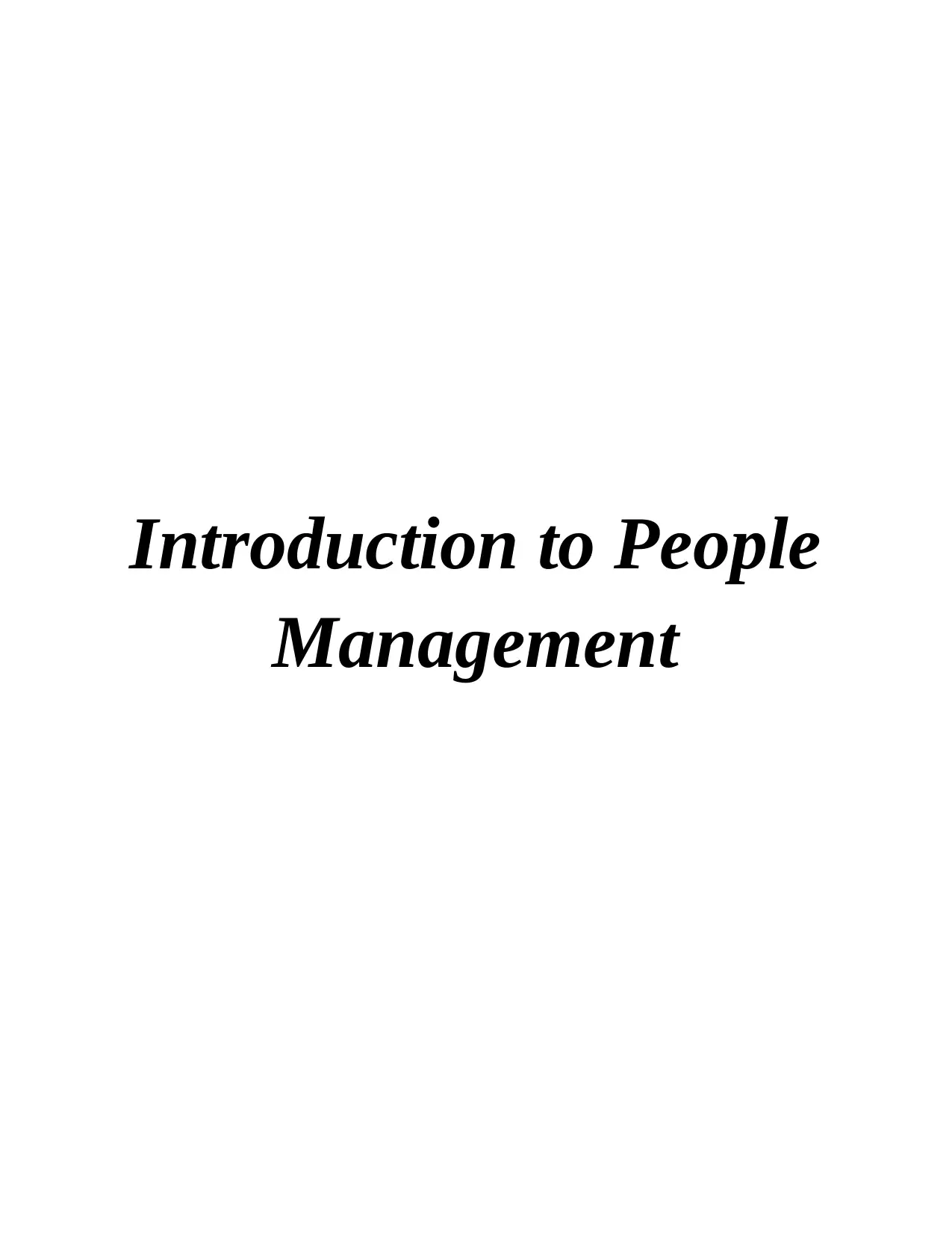
Introduction to People
Management
Management
Secure Best Marks with AI Grader
Need help grading? Try our AI Grader for instant feedback on your assignments.
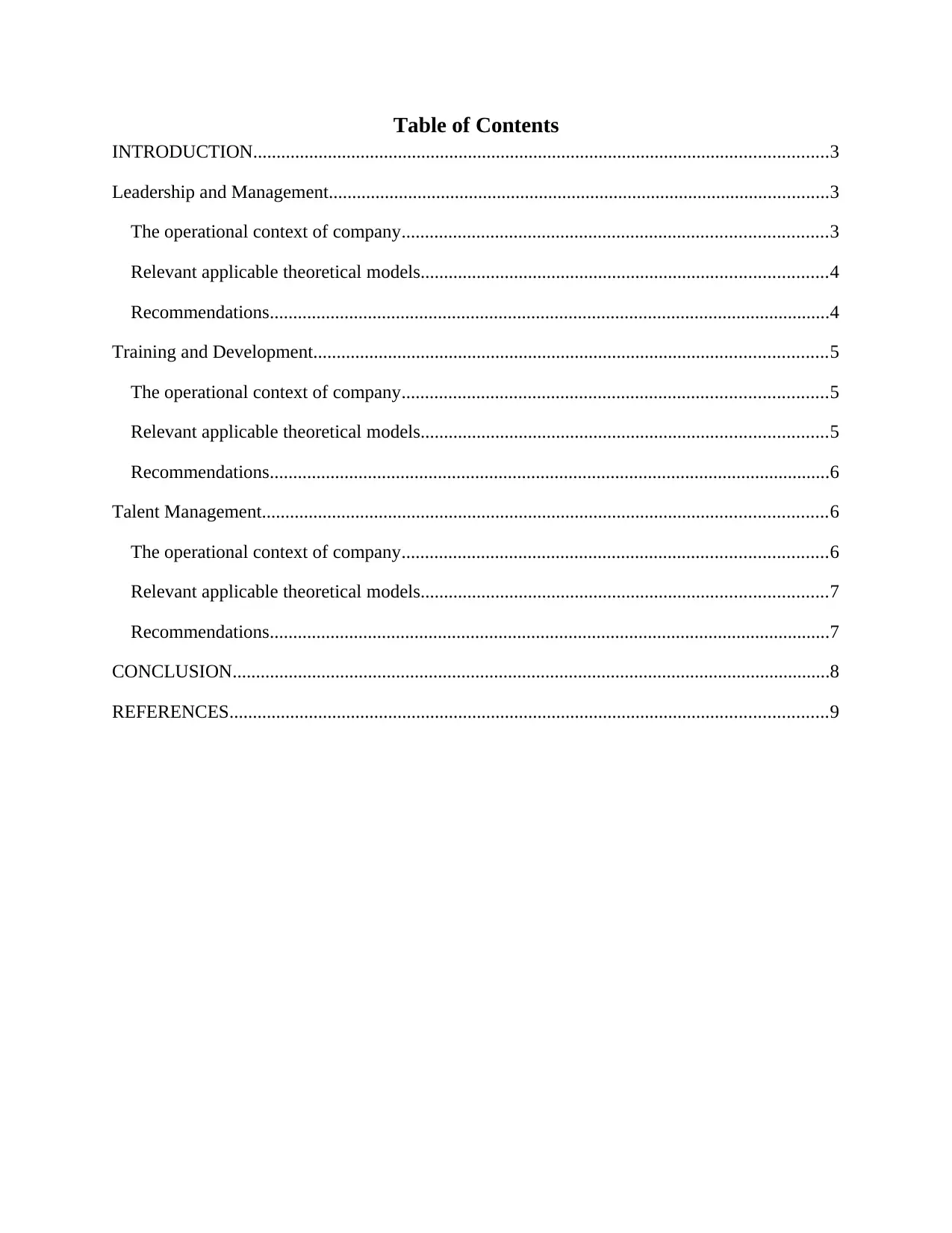
Table of Contents
INTRODUCTION...........................................................................................................................3
Leadership and Management...........................................................................................................3
The operational context of company...........................................................................................3
Relevant applicable theoretical models.......................................................................................4
Recommendations........................................................................................................................4
Training and Development..............................................................................................................5
The operational context of company...........................................................................................5
Relevant applicable theoretical models.......................................................................................5
Recommendations........................................................................................................................6
Talent Management.........................................................................................................................6
The operational context of company...........................................................................................6
Relevant applicable theoretical models.......................................................................................7
Recommendations........................................................................................................................7
CONCLUSION................................................................................................................................8
REFERENCES................................................................................................................................9
INTRODUCTION...........................................................................................................................3
Leadership and Management...........................................................................................................3
The operational context of company...........................................................................................3
Relevant applicable theoretical models.......................................................................................4
Recommendations........................................................................................................................4
Training and Development..............................................................................................................5
The operational context of company...........................................................................................5
Relevant applicable theoretical models.......................................................................................5
Recommendations........................................................................................................................6
Talent Management.........................................................................................................................6
The operational context of company...........................................................................................6
Relevant applicable theoretical models.......................................................................................7
Recommendations........................................................................................................................7
CONCLUSION................................................................................................................................8
REFERENCES................................................................................................................................9

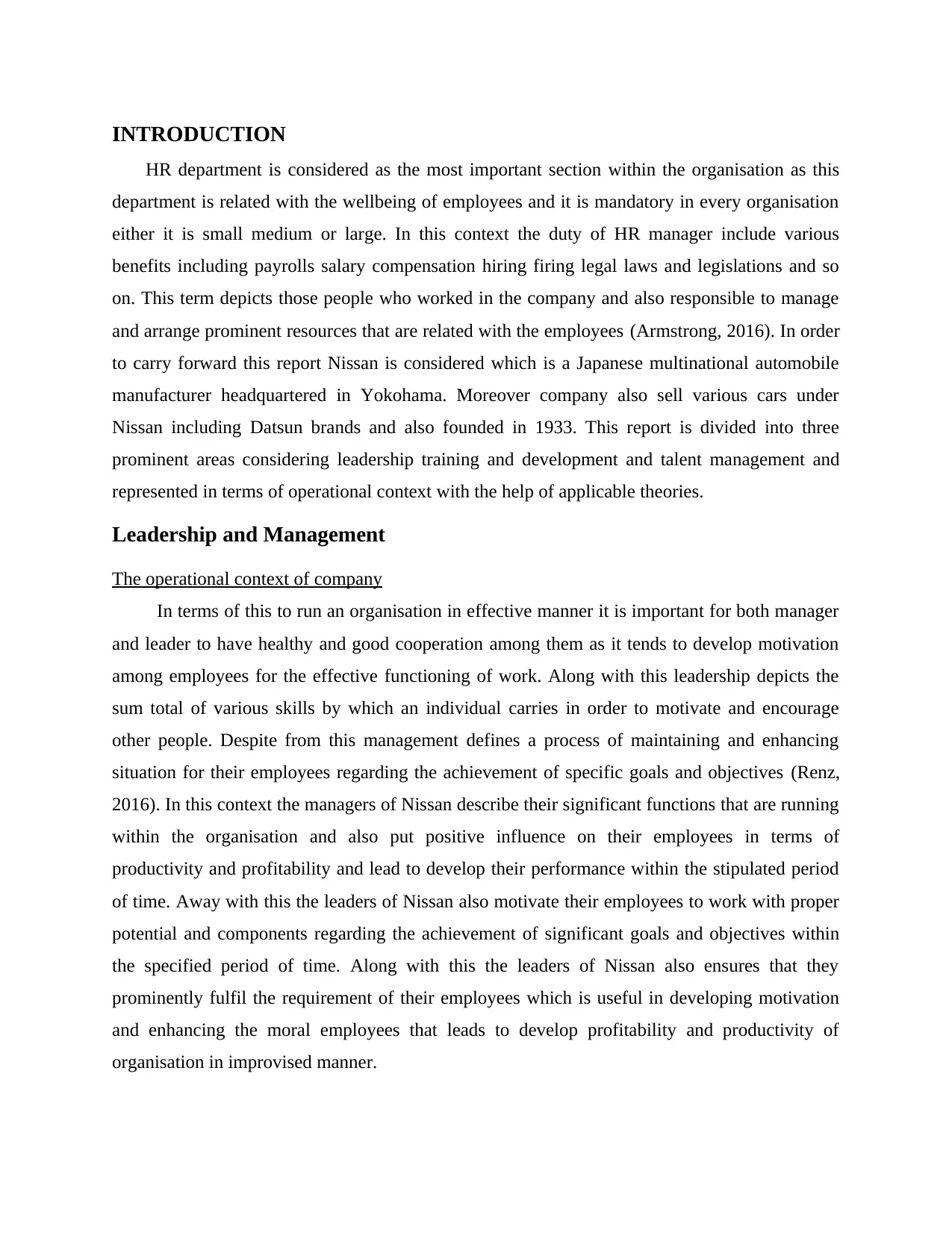
INTRODUCTION
HR department is considered as the most important section within the organisation as this
department is related with the wellbeing of employees and it is mandatory in every organisation
either it is small medium or large. In this context the duty of HR manager include various
benefits including payrolls salary compensation hiring firing legal laws and legislations and so
on. This term depicts those people who worked in the company and also responsible to manage
and arrange prominent resources that are related with the employees (Armstrong, 2016). In order
to carry forward this report Nissan is considered which is a Japanese multinational automobile
manufacturer headquartered in Yokohama. Moreover company also sell various cars under
Nissan including Datsun brands and also founded in 1933. This report is divided into three
prominent areas considering leadership training and development and talent management and
represented in terms of operational context with the help of applicable theories.
Leadership and Management
The operational context of company
In terms of this to run an organisation in effective manner it is important for both manager
and leader to have healthy and good cooperation among them as it tends to develop motivation
among employees for the effective functioning of work. Along with this leadership depicts the
sum total of various skills by which an individual carries in order to motivate and encourage
other people. Despite from this management defines a process of maintaining and enhancing
situation for their employees regarding the achievement of specific goals and objectives (Renz,
2016). In this context the managers of Nissan describe their significant functions that are running
within the organisation and also put positive influence on their employees in terms of
productivity and profitability and lead to develop their performance within the stipulated period
of time. Away with this the leaders of Nissan also motivate their employees to work with proper
potential and components regarding the achievement of significant goals and objectives within
the specified period of time. Along with this the leaders of Nissan also ensures that they
prominently fulfil the requirement of their employees which is useful in developing motivation
and enhancing the moral employees that leads to develop profitability and productivity of
organisation in improvised manner.
HR department is considered as the most important section within the organisation as this
department is related with the wellbeing of employees and it is mandatory in every organisation
either it is small medium or large. In this context the duty of HR manager include various
benefits including payrolls salary compensation hiring firing legal laws and legislations and so
on. This term depicts those people who worked in the company and also responsible to manage
and arrange prominent resources that are related with the employees (Armstrong, 2016). In order
to carry forward this report Nissan is considered which is a Japanese multinational automobile
manufacturer headquartered in Yokohama. Moreover company also sell various cars under
Nissan including Datsun brands and also founded in 1933. This report is divided into three
prominent areas considering leadership training and development and talent management and
represented in terms of operational context with the help of applicable theories.
Leadership and Management
The operational context of company
In terms of this to run an organisation in effective manner it is important for both manager
and leader to have healthy and good cooperation among them as it tends to develop motivation
among employees for the effective functioning of work. Along with this leadership depicts the
sum total of various skills by which an individual carries in order to motivate and encourage
other people. Despite from this management defines a process of maintaining and enhancing
situation for their employees regarding the achievement of specific goals and objectives (Renz,
2016). In this context the managers of Nissan describe their significant functions that are running
within the organisation and also put positive influence on their employees in terms of
productivity and profitability and lead to develop their performance within the stipulated period
of time. Away with this the leaders of Nissan also motivate their employees to work with proper
potential and components regarding the achievement of significant goals and objectives within
the specified period of time. Along with this the leaders of Nissan also ensures that they
prominently fulfil the requirement of their employees which is useful in developing motivation
and enhancing the moral employees that leads to develop profitability and productivity of
organisation in improvised manner.
Secure Best Marks with AI Grader
Need help grading? Try our AI Grader for instant feedback on your assignments.
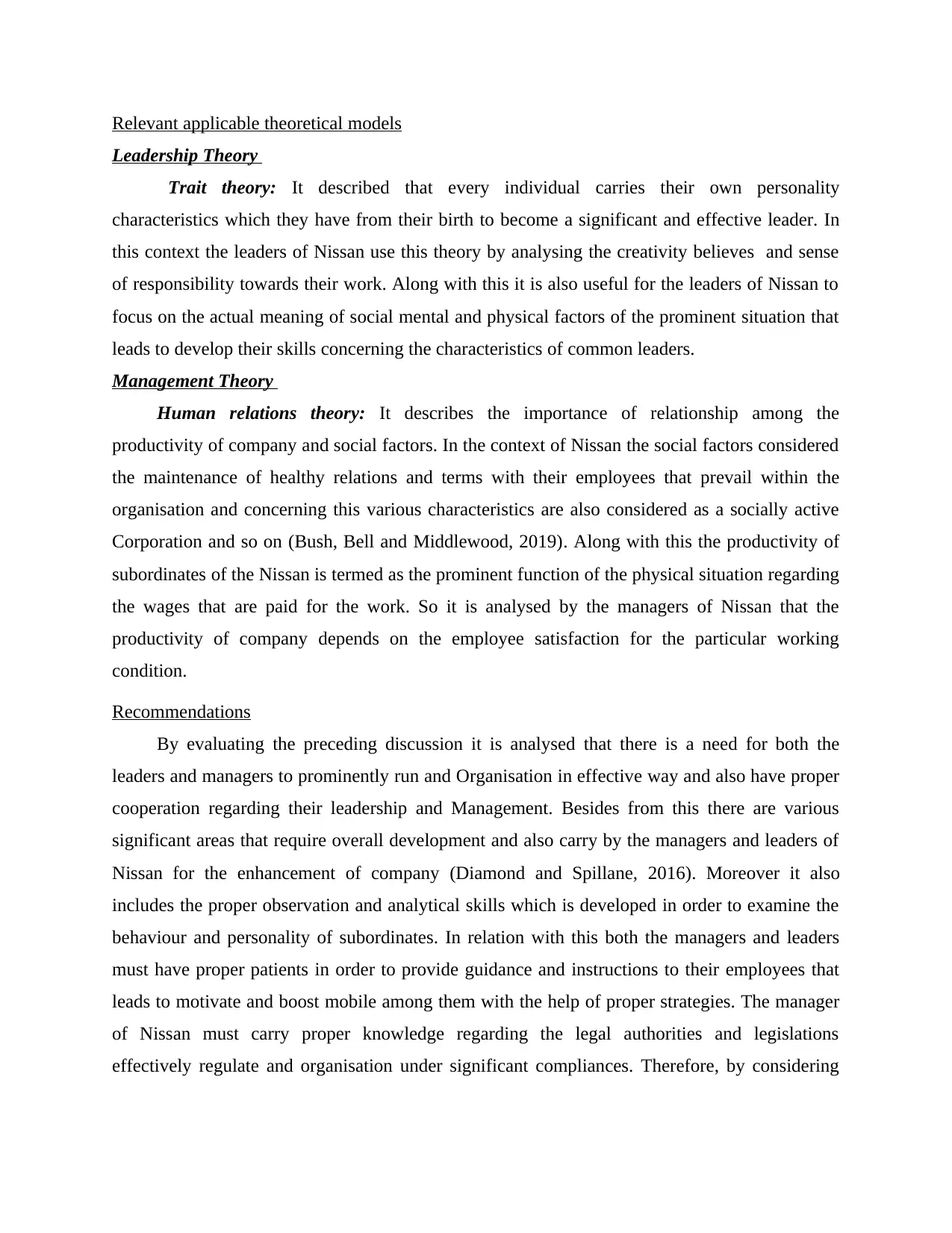
Relevant applicable theoretical models
Leadership Theory
Trait theory: It described that every individual carries their own personality
characteristics which they have from their birth to become a significant and effective leader. In
this context the leaders of Nissan use this theory by analysing the creativity believes and sense
of responsibility towards their work. Along with this it is also useful for the leaders of Nissan to
focus on the actual meaning of social mental and physical factors of the prominent situation that
leads to develop their skills concerning the characteristics of common leaders.
Management Theory
Human relations theory: It describes the importance of relationship among the
productivity of company and social factors. In the context of Nissan the social factors considered
the maintenance of healthy relations and terms with their employees that prevail within the
organisation and concerning this various characteristics are also considered as a socially active
Corporation and so on (Bush, Bell and Middlewood, 2019). Along with this the productivity of
subordinates of the Nissan is termed as the prominent function of the physical situation regarding
the wages that are paid for the work. So it is analysed by the managers of Nissan that the
productivity of company depends on the employee satisfaction for the particular working
condition.
Recommendations
By evaluating the preceding discussion it is analysed that there is a need for both the
leaders and managers to prominently run and Organisation in effective way and also have proper
cooperation regarding their leadership and Management. Besides from this there are various
significant areas that require overall development and also carry by the managers and leaders of
Nissan for the enhancement of company (Diamond and Spillane, 2016). Moreover it also
includes the proper observation and analytical skills which is developed in order to examine the
behaviour and personality of subordinates. In relation with this both the managers and leaders
must have proper patients in order to provide guidance and instructions to their employees that
leads to motivate and boost mobile among them with the help of proper strategies. The manager
of Nissan must carry proper knowledge regarding the legal authorities and legislations
effectively regulate and organisation under significant compliances. Therefore, by considering
Leadership Theory
Trait theory: It described that every individual carries their own personality
characteristics which they have from their birth to become a significant and effective leader. In
this context the leaders of Nissan use this theory by analysing the creativity believes and sense
of responsibility towards their work. Along with this it is also useful for the leaders of Nissan to
focus on the actual meaning of social mental and physical factors of the prominent situation that
leads to develop their skills concerning the characteristics of common leaders.
Management Theory
Human relations theory: It describes the importance of relationship among the
productivity of company and social factors. In the context of Nissan the social factors considered
the maintenance of healthy relations and terms with their employees that prevail within the
organisation and concerning this various characteristics are also considered as a socially active
Corporation and so on (Bush, Bell and Middlewood, 2019). Along with this the productivity of
subordinates of the Nissan is termed as the prominent function of the physical situation regarding
the wages that are paid for the work. So it is analysed by the managers of Nissan that the
productivity of company depends on the employee satisfaction for the particular working
condition.
Recommendations
By evaluating the preceding discussion it is analysed that there is a need for both the
leaders and managers to prominently run and Organisation in effective way and also have proper
cooperation regarding their leadership and Management. Besides from this there are various
significant areas that require overall development and also carry by the managers and leaders of
Nissan for the enhancement of company (Diamond and Spillane, 2016). Moreover it also
includes the proper observation and analytical skills which is developed in order to examine the
behaviour and personality of subordinates. In relation with this both the managers and leaders
must have proper patients in order to provide guidance and instructions to their employees that
leads to motivate and boost mobile among them with the help of proper strategies. The manager
of Nissan must carry proper knowledge regarding the legal authorities and legislations
effectively regulate and organisation under significant compliances. Therefore, by considering
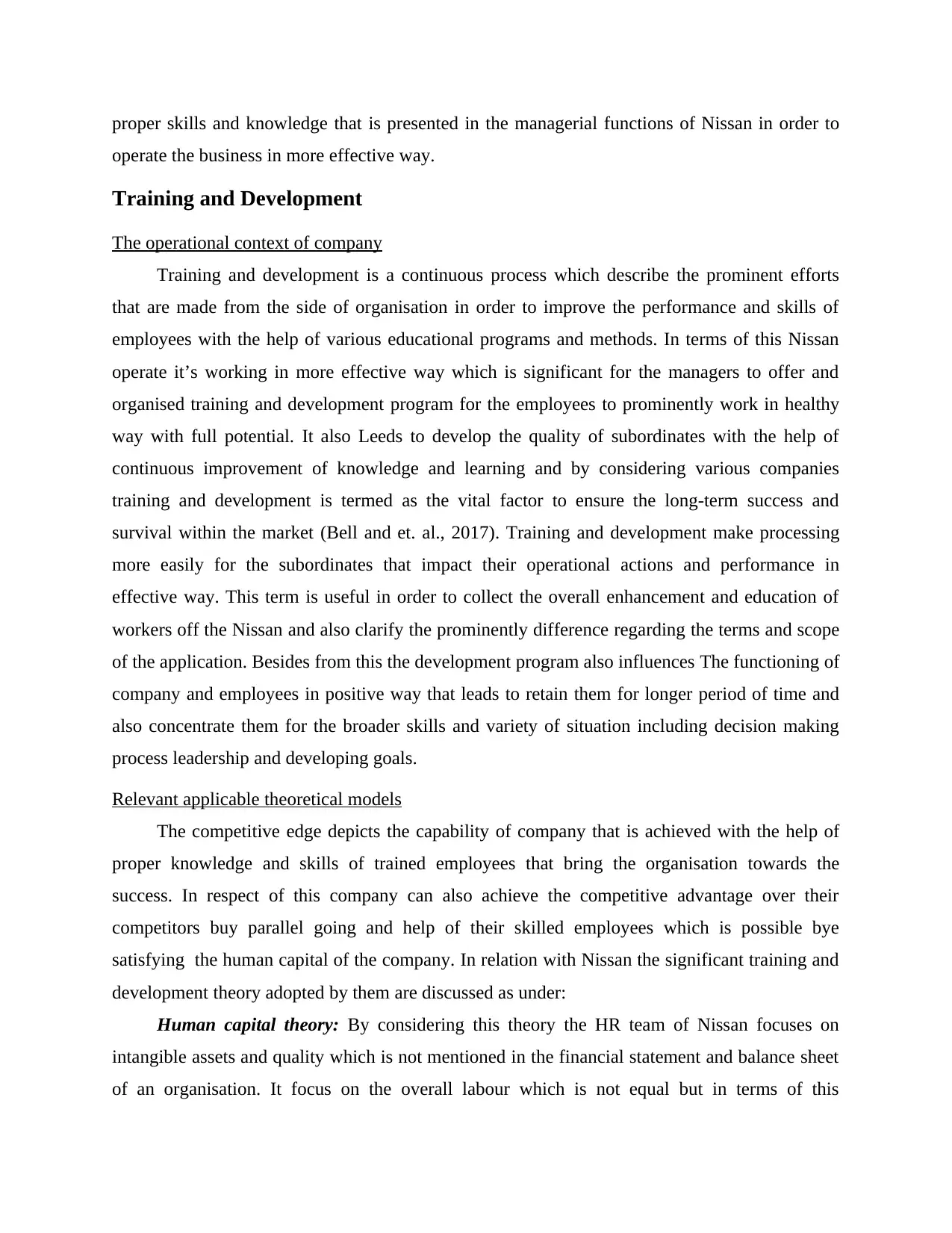
proper skills and knowledge that is presented in the managerial functions of Nissan in order to
operate the business in more effective way.
Training and Development
The operational context of company
Training and development is a continuous process which describe the prominent efforts
that are made from the side of organisation in order to improve the performance and skills of
employees with the help of various educational programs and methods. In terms of this Nissan
operate it’s working in more effective way which is significant for the managers to offer and
organised training and development program for the employees to prominently work in healthy
way with full potential. It also Leeds to develop the quality of subordinates with the help of
continuous improvement of knowledge and learning and by considering various companies
training and development is termed as the vital factor to ensure the long-term success and
survival within the market (Bell and et. al., 2017). Training and development make processing
more easily for the subordinates that impact their operational actions and performance in
effective way. This term is useful in order to collect the overall enhancement and education of
workers off the Nissan and also clarify the prominently difference regarding the terms and scope
of the application. Besides from this the development program also influences The functioning of
company and employees in positive way that leads to retain them for longer period of time and
also concentrate them for the broader skills and variety of situation including decision making
process leadership and developing goals.
Relevant applicable theoretical models
The competitive edge depicts the capability of company that is achieved with the help of
proper knowledge and skills of trained employees that bring the organisation towards the
success. In respect of this company can also achieve the competitive advantage over their
competitors buy parallel going and help of their skilled employees which is possible bye
satisfying the human capital of the company. In relation with Nissan the significant training and
development theory adopted by them are discussed as under:
Human capital theory: By considering this theory the HR team of Nissan focuses on
intangible assets and quality which is not mentioned in the financial statement and balance sheet
of an organisation. It focus on the overall labour which is not equal but in terms of this
operate the business in more effective way.
Training and Development
The operational context of company
Training and development is a continuous process which describe the prominent efforts
that are made from the side of organisation in order to improve the performance and skills of
employees with the help of various educational programs and methods. In terms of this Nissan
operate it’s working in more effective way which is significant for the managers to offer and
organised training and development program for the employees to prominently work in healthy
way with full potential. It also Leeds to develop the quality of subordinates with the help of
continuous improvement of knowledge and learning and by considering various companies
training and development is termed as the vital factor to ensure the long-term success and
survival within the market (Bell and et. al., 2017). Training and development make processing
more easily for the subordinates that impact their operational actions and performance in
effective way. This term is useful in order to collect the overall enhancement and education of
workers off the Nissan and also clarify the prominently difference regarding the terms and scope
of the application. Besides from this the development program also influences The functioning of
company and employees in positive way that leads to retain them for longer period of time and
also concentrate them for the broader skills and variety of situation including decision making
process leadership and developing goals.
Relevant applicable theoretical models
The competitive edge depicts the capability of company that is achieved with the help of
proper knowledge and skills of trained employees that bring the organisation towards the
success. In respect of this company can also achieve the competitive advantage over their
competitors buy parallel going and help of their skilled employees which is possible bye
satisfying the human capital of the company. In relation with Nissan the significant training and
development theory adopted by them are discussed as under:
Human capital theory: By considering this theory the HR team of Nissan focuses on
intangible assets and quality which is not mentioned in the financial statement and balance sheet
of an organisation. It focus on the overall labour which is not equal but in terms of this
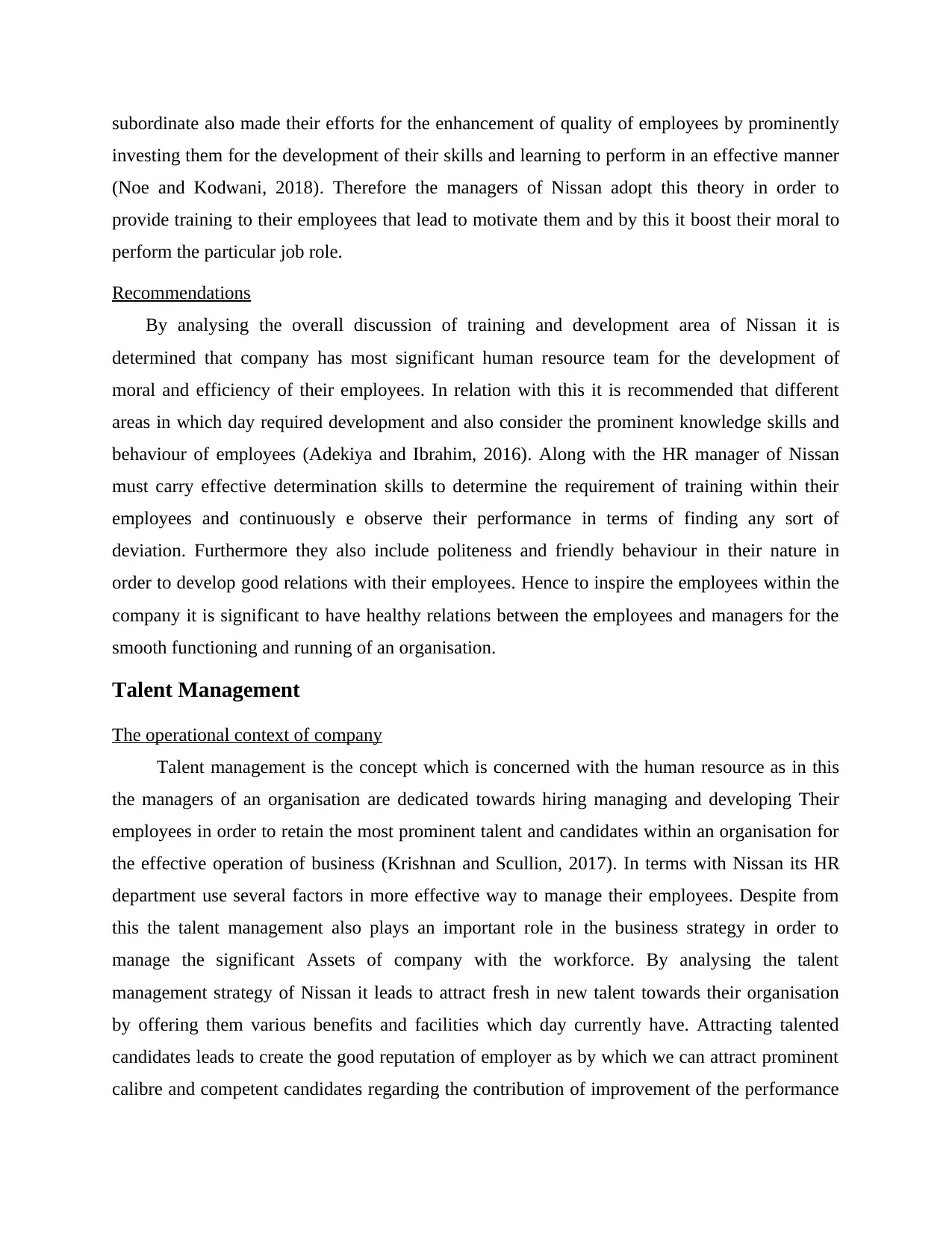
subordinate also made their efforts for the enhancement of quality of employees by prominently
investing them for the development of their skills and learning to perform in an effective manner
(Noe and Kodwani, 2018). Therefore the managers of Nissan adopt this theory in order to
provide training to their employees that lead to motivate them and by this it boost their moral to
perform the particular job role.
Recommendations
By analysing the overall discussion of training and development area of Nissan it is
determined that company has most significant human resource team for the development of
moral and efficiency of their employees. In relation with this it is recommended that different
areas in which day required development and also consider the prominent knowledge skills and
behaviour of employees (Adekiya and Ibrahim, 2016). Along with the HR manager of Nissan
must carry effective determination skills to determine the requirement of training within their
employees and continuously e observe their performance in terms of finding any sort of
deviation. Furthermore they also include politeness and friendly behaviour in their nature in
order to develop good relations with their employees. Hence to inspire the employees within the
company it is significant to have healthy relations between the employees and managers for the
smooth functioning and running of an organisation.
Talent Management
The operational context of company
Talent management is the concept which is concerned with the human resource as in this
the managers of an organisation are dedicated towards hiring managing and developing Their
employees in order to retain the most prominent talent and candidates within an organisation for
the effective operation of business (Krishnan and Scullion, 2017). In terms with Nissan its HR
department use several factors in more effective way to manage their employees. Despite from
this the talent management also plays an important role in the business strategy in order to
manage the significant Assets of company with the workforce. By analysing the talent
management strategy of Nissan it leads to attract fresh in new talent towards their organisation
by offering them various benefits and facilities which day currently have. Attracting talented
candidates leads to create the good reputation of employer as by which we can attract prominent
calibre and competent candidates regarding the contribution of improvement of the performance
investing them for the development of their skills and learning to perform in an effective manner
(Noe and Kodwani, 2018). Therefore the managers of Nissan adopt this theory in order to
provide training to their employees that lead to motivate them and by this it boost their moral to
perform the particular job role.
Recommendations
By analysing the overall discussion of training and development area of Nissan it is
determined that company has most significant human resource team for the development of
moral and efficiency of their employees. In relation with this it is recommended that different
areas in which day required development and also consider the prominent knowledge skills and
behaviour of employees (Adekiya and Ibrahim, 2016). Along with the HR manager of Nissan
must carry effective determination skills to determine the requirement of training within their
employees and continuously e observe their performance in terms of finding any sort of
deviation. Furthermore they also include politeness and friendly behaviour in their nature in
order to develop good relations with their employees. Hence to inspire the employees within the
company it is significant to have healthy relations between the employees and managers for the
smooth functioning and running of an organisation.
Talent Management
The operational context of company
Talent management is the concept which is concerned with the human resource as in this
the managers of an organisation are dedicated towards hiring managing and developing Their
employees in order to retain the most prominent talent and candidates within an organisation for
the effective operation of business (Krishnan and Scullion, 2017). In terms with Nissan its HR
department use several factors in more effective way to manage their employees. Despite from
this the talent management also plays an important role in the business strategy in order to
manage the significant Assets of company with the workforce. By analysing the talent
management strategy of Nissan it leads to attract fresh in new talent towards their organisation
by offering them various benefits and facilities which day currently have. Attracting talented
candidates leads to create the good reputation of employer as by which we can attract prominent
calibre and competent candidates regarding the contribution of improvement of the performance
Paraphrase This Document
Need a fresh take? Get an instant paraphrase of this document with our AI Paraphraser
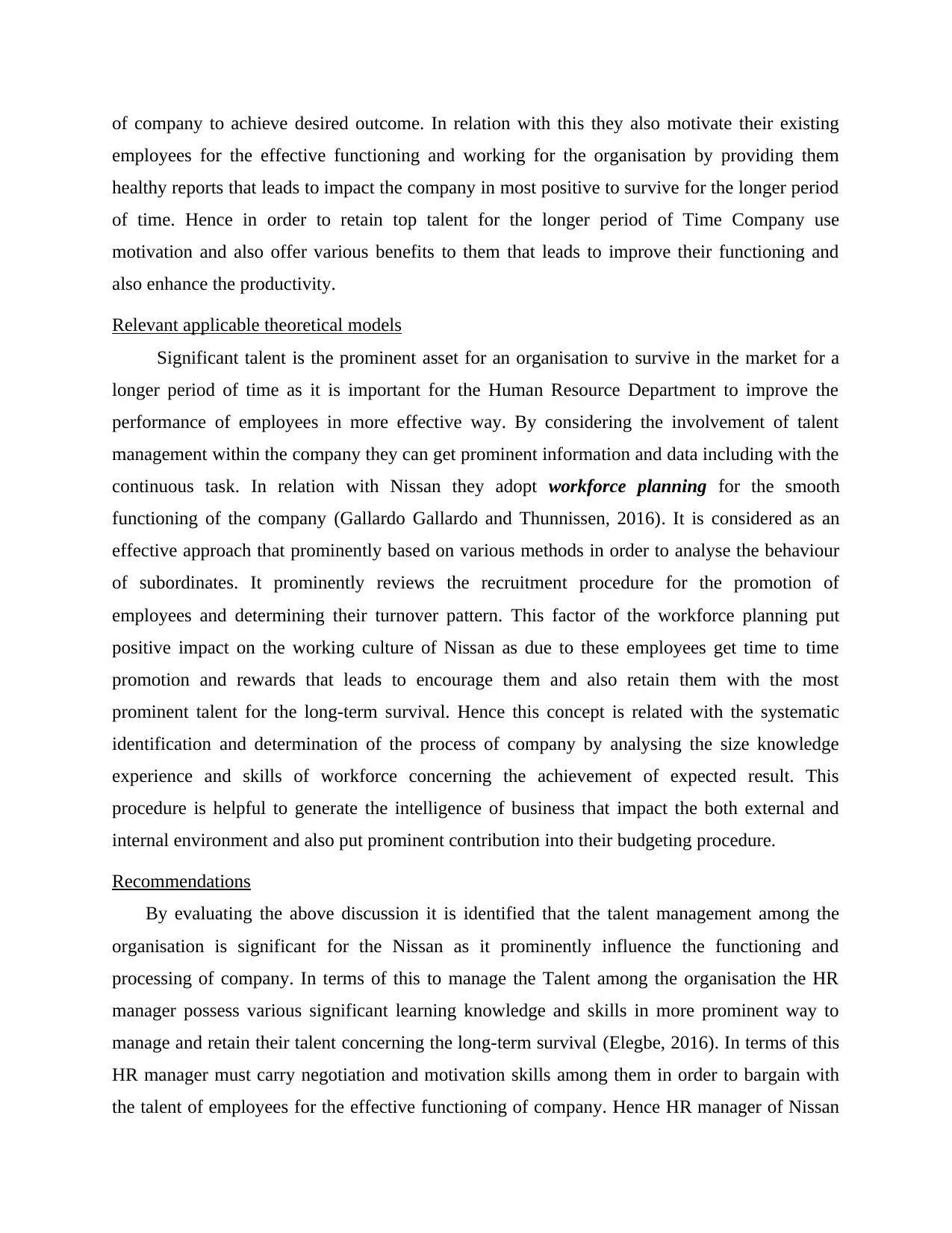
of company to achieve desired outcome. In relation with this they also motivate their existing
employees for the effective functioning and working for the organisation by providing them
healthy reports that leads to impact the company in most positive to survive for the longer period
of time. Hence in order to retain top talent for the longer period of Time Company use
motivation and also offer various benefits to them that leads to improve their functioning and
also enhance the productivity.
Relevant applicable theoretical models
Significant talent is the prominent asset for an organisation to survive in the market for a
longer period of time as it is important for the Human Resource Department to improve the
performance of employees in more effective way. By considering the involvement of talent
management within the company they can get prominent information and data including with the
continuous task. In relation with Nissan they adopt workforce planning for the smooth
functioning of the company (Gallardo Gallardo and Thunnissen, 2016). It is considered as an
effective approach that prominently based on various methods in order to analyse the behaviour
of subordinates. It prominently reviews the recruitment procedure for the promotion of
employees and determining their turnover pattern. This factor of the workforce planning put
positive impact on the working culture of Nissan as due to these employees get time to time
promotion and rewards that leads to encourage them and also retain them with the most
prominent talent for the long-term survival. Hence this concept is related with the systematic
identification and determination of the process of company by analysing the size knowledge
experience and skills of workforce concerning the achievement of expected result. This
procedure is helpful to generate the intelligence of business that impact the both external and
internal environment and also put prominent contribution into their budgeting procedure.
Recommendations
By evaluating the above discussion it is identified that the talent management among the
organisation is significant for the Nissan as it prominently influence the functioning and
processing of company. In terms of this to manage the Talent among the organisation the HR
manager possess various significant learning knowledge and skills in more prominent way to
manage and retain their talent concerning the long-term survival (Elegbe, 2016). In terms of this
HR manager must carry negotiation and motivation skills among them in order to bargain with
the talent of employees for the effective functioning of company. Hence HR manager of Nissan
employees for the effective functioning and working for the organisation by providing them
healthy reports that leads to impact the company in most positive to survive for the longer period
of time. Hence in order to retain top talent for the longer period of Time Company use
motivation and also offer various benefits to them that leads to improve their functioning and
also enhance the productivity.
Relevant applicable theoretical models
Significant talent is the prominent asset for an organisation to survive in the market for a
longer period of time as it is important for the Human Resource Department to improve the
performance of employees in more effective way. By considering the involvement of talent
management within the company they can get prominent information and data including with the
continuous task. In relation with Nissan they adopt workforce planning for the smooth
functioning of the company (Gallardo Gallardo and Thunnissen, 2016). It is considered as an
effective approach that prominently based on various methods in order to analyse the behaviour
of subordinates. It prominently reviews the recruitment procedure for the promotion of
employees and determining their turnover pattern. This factor of the workforce planning put
positive impact on the working culture of Nissan as due to these employees get time to time
promotion and rewards that leads to encourage them and also retain them with the most
prominent talent for the long-term survival. Hence this concept is related with the systematic
identification and determination of the process of company by analysing the size knowledge
experience and skills of workforce concerning the achievement of expected result. This
procedure is helpful to generate the intelligence of business that impact the both external and
internal environment and also put prominent contribution into their budgeting procedure.
Recommendations
By evaluating the above discussion it is identified that the talent management among the
organisation is significant for the Nissan as it prominently influence the functioning and
processing of company. In terms of this to manage the Talent among the organisation the HR
manager possess various significant learning knowledge and skills in more prominent way to
manage and retain their talent concerning the long-term survival (Elegbe, 2016). In terms of this
HR manager must carry negotiation and motivation skills among them in order to bargain with
the talent of employees for the effective functioning of company. Hence HR manager of Nissan
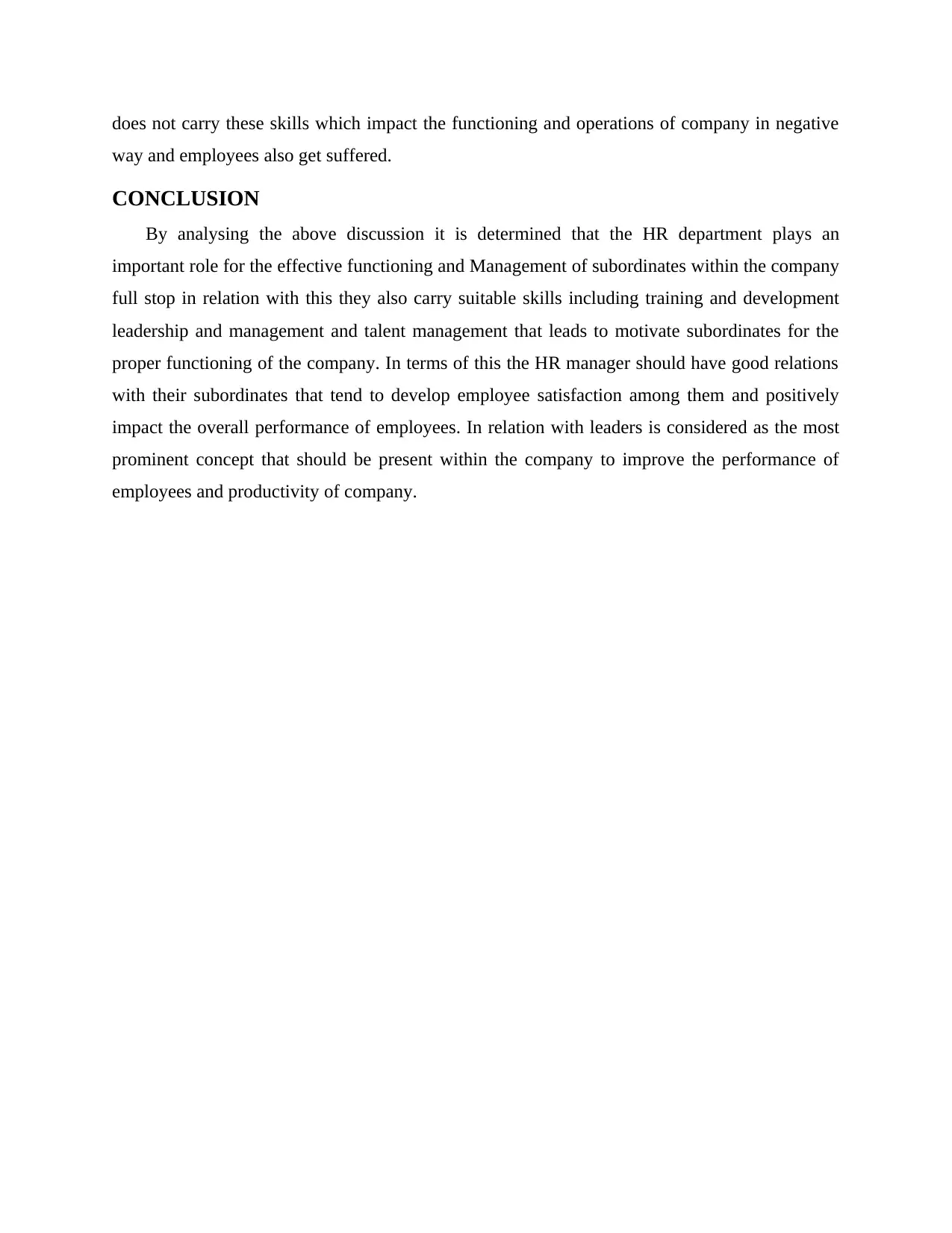
does not carry these skills which impact the functioning and operations of company in negative
way and employees also get suffered.
CONCLUSION
By analysing the above discussion it is determined that the HR department plays an
important role for the effective functioning and Management of subordinates within the company
full stop in relation with this they also carry suitable skills including training and development
leadership and management and talent management that leads to motivate subordinates for the
proper functioning of the company. In terms of this the HR manager should have good relations
with their subordinates that tend to develop employee satisfaction among them and positively
impact the overall performance of employees. In relation with leaders is considered as the most
prominent concept that should be present within the company to improve the performance of
employees and productivity of company.
way and employees also get suffered.
CONCLUSION
By analysing the above discussion it is determined that the HR department plays an
important role for the effective functioning and Management of subordinates within the company
full stop in relation with this they also carry suitable skills including training and development
leadership and management and talent management that leads to motivate subordinates for the
proper functioning of the company. In terms of this the HR manager should have good relations
with their subordinates that tend to develop employee satisfaction among them and positively
impact the overall performance of employees. In relation with leaders is considered as the most
prominent concept that should be present within the company to improve the performance of
employees and productivity of company.
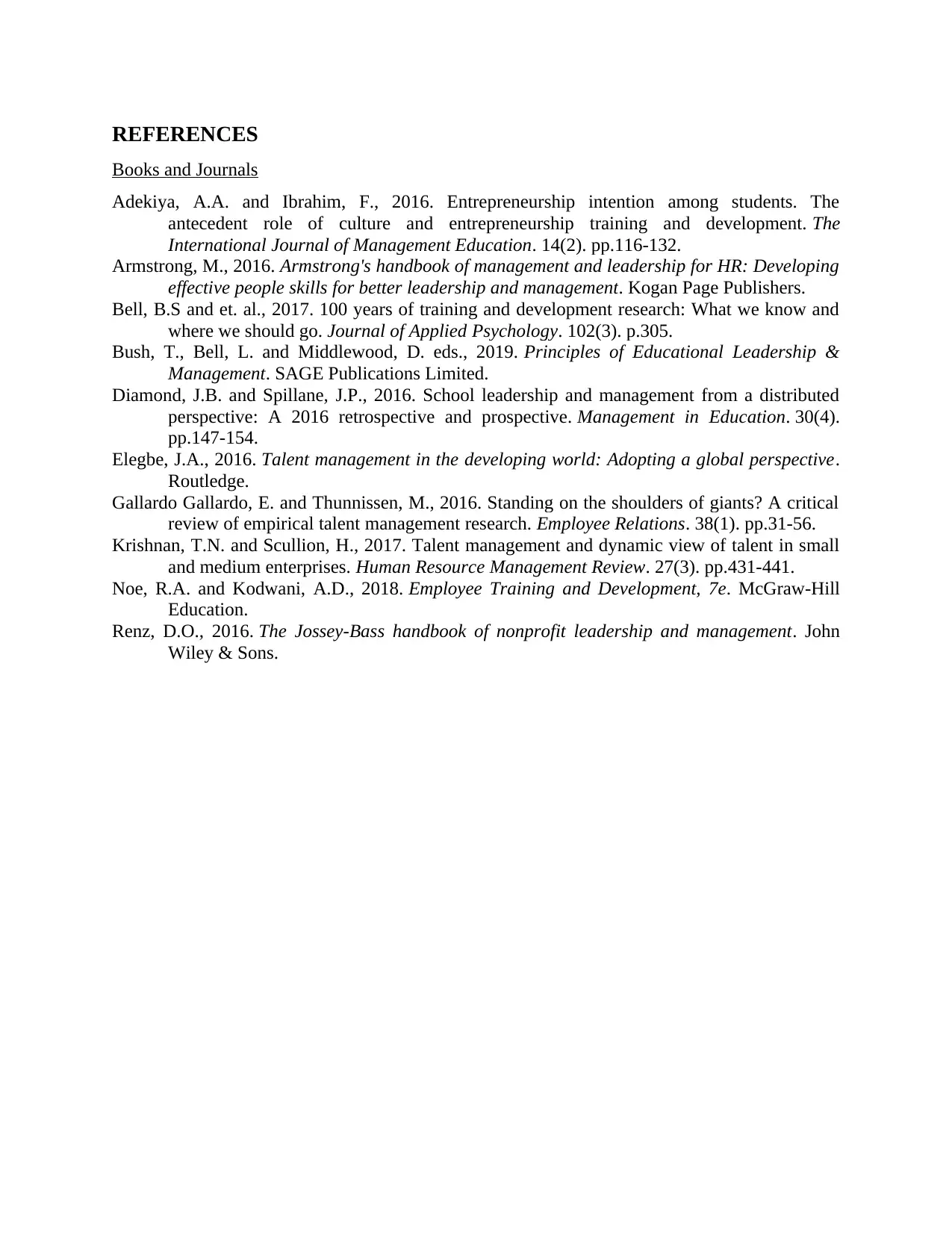
REFERENCES
Books and Journals
Adekiya, A.A. and Ibrahim, F., 2016. Entrepreneurship intention among students. The
antecedent role of culture and entrepreneurship training and development. The
International Journal of Management Education. 14(2). pp.116-132.
Armstrong, M., 2016. Armstrong's handbook of management and leadership for HR: Developing
effective people skills for better leadership and management. Kogan Page Publishers.
Bell, B.S and et. al., 2017. 100 years of training and development research: What we know and
where we should go. Journal of Applied Psychology. 102(3). p.305.
Bush, T., Bell, L. and Middlewood, D. eds., 2019. Principles of Educational Leadership &
Management. SAGE Publications Limited.
Diamond, J.B. and Spillane, J.P., 2016. School leadership and management from a distributed
perspective: A 2016 retrospective and prospective. Management in Education. 30(4).
pp.147-154.
Elegbe, J.A., 2016. Talent management in the developing world: Adopting a global perspective.
Routledge.
Gallardo Gallardo, E. and Thunnissen, M., 2016. Standing on the shoulders of giants? A critical
review of empirical talent management research. Employee Relations. 38(1). pp.31-56.
Krishnan, T.N. and Scullion, H., 2017. Talent management and dynamic view of talent in small
and medium enterprises. Human Resource Management Review. 27(3). pp.431-441.
Noe, R.A. and Kodwani, A.D., 2018. Employee Training and Development, 7e. McGraw-Hill
Education.
Renz, D.O., 2016. The Jossey-Bass handbook of nonprofit leadership and management. John
Wiley & Sons.
Books and Journals
Adekiya, A.A. and Ibrahim, F., 2016. Entrepreneurship intention among students. The
antecedent role of culture and entrepreneurship training and development. The
International Journal of Management Education. 14(2). pp.116-132.
Armstrong, M., 2016. Armstrong's handbook of management and leadership for HR: Developing
effective people skills for better leadership and management. Kogan Page Publishers.
Bell, B.S and et. al., 2017. 100 years of training and development research: What we know and
where we should go. Journal of Applied Psychology. 102(3). p.305.
Bush, T., Bell, L. and Middlewood, D. eds., 2019. Principles of Educational Leadership &
Management. SAGE Publications Limited.
Diamond, J.B. and Spillane, J.P., 2016. School leadership and management from a distributed
perspective: A 2016 retrospective and prospective. Management in Education. 30(4).
pp.147-154.
Elegbe, J.A., 2016. Talent management in the developing world: Adopting a global perspective.
Routledge.
Gallardo Gallardo, E. and Thunnissen, M., 2016. Standing on the shoulders of giants? A critical
review of empirical talent management research. Employee Relations. 38(1). pp.31-56.
Krishnan, T.N. and Scullion, H., 2017. Talent management and dynamic view of talent in small
and medium enterprises. Human Resource Management Review. 27(3). pp.431-441.
Noe, R.A. and Kodwani, A.D., 2018. Employee Training and Development, 7e. McGraw-Hill
Education.
Renz, D.O., 2016. The Jossey-Bass handbook of nonprofit leadership and management. John
Wiley & Sons.
1 out of 10
Related Documents
Your All-in-One AI-Powered Toolkit for Academic Success.
+13062052269
info@desklib.com
Available 24*7 on WhatsApp / Email
![[object Object]](/_next/static/media/star-bottom.7253800d.svg)
Unlock your academic potential
© 2024 | Zucol Services PVT LTD | All rights reserved.




